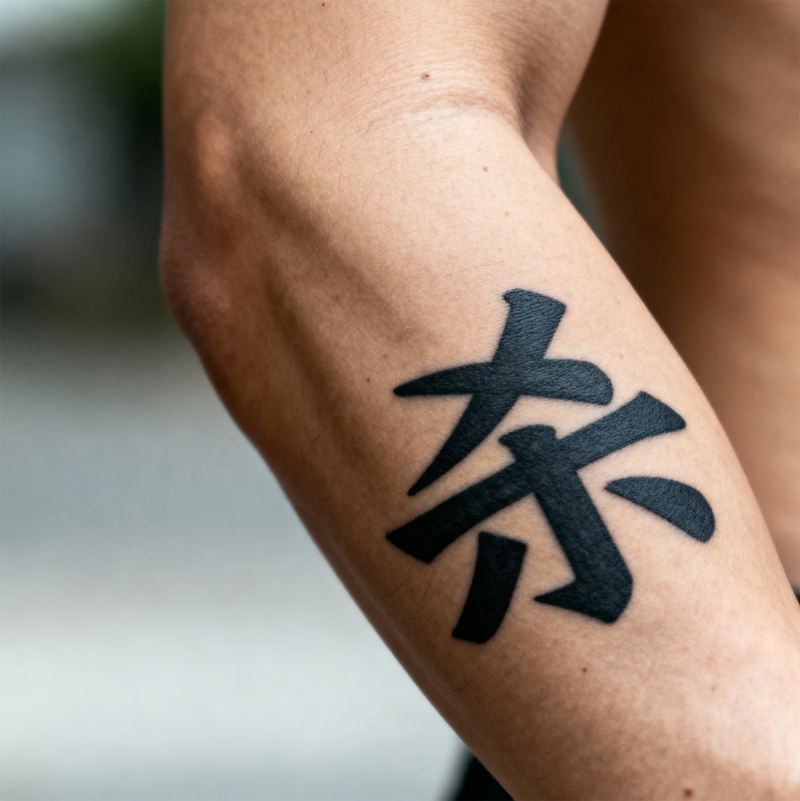"杀" as a Tattoo: Meanings and Strong Warnings
Getting "杀" as a tattoo is a very bold and risky choice. Its interpretation depends heavily on the wearer's intent and the cultural context of the viewer.
Potential Intended Meanings (from the wearer's perspective):
Strength and Power: The character can symbolize raw power, dominance, and the ability to overcome any obstacle. It can represent an "I will destroy my enemies" mentality.
Overcoming Adversity: In a personal sense, it can mean "killing" one's inner demons, past struggles, or weaknesses. It's a declaration of victory over one's own battles.
Intensity in Competition: For an athlete or gamer, it could represent a competitive spirit, the drive to "kill" the competition, and a relentless will to win.
Aesthetic Appeal: Some might be drawn to its simple, sharp, and aggressive-looking strokes, appreciating it as a piece of calligraphy without deep consideration of its meaning.

STRONG WARNINGS & NEGATIVE INTERPRETATIONS
This is crucial to understand before considering this tattoo.
Overwhelmingly Violent Connotation: For the vast majority of Chinese speakers and those familiar with the character, "杀" directly and unambiguously means "KILL." It is not abstract or poetic in its primary meaning. It is harsh, brutal, and final.
Association with Criminals and Violence: In many East Asian cultures (China, Japan, where the kanji 殺 is used), tattoos with characters like this are sometimes associated with organized crime (e.g., the Yakuza in Japan). It can immediately mark you as someone dangerous, aggressive, or involved in violence.
Social Stigma and Misunderstanding: You will likely face negative reactions, fear, or judgment from people who understand the character. It can close doors socially and professionally. People may feel uncomfortable or unsafe around you.
Lack of Nuance in a Tattoo Context: While "杀" has nuanced meanings in language, as a standalone tattoo, it loses that subtlety. It doesn't say "I overcome adversity" to a viewer; it screams "KILL." The burden of explanation will always be on you.
Conclusion and Recommendation
While "杀" is a powerful character linguistically, it is generally considered a very poor and even dangerous choice for a tattoo.
The negative and violent connotations far outweigh any potential personal or abstract meaning. The risk of being severely misunderstood, stigmatized, or even getting into trouble is very high.
If you are drawn to the ideas of strength, overcoming struggle, or a competitive spirit, there are countless other Chinese characters, symbols, or designs that convey these meanings in a much more positive and culturally respectful way. For example:
力 (lì) - Strength, power.
武 (wǔ) - Martial, military; embodies the spirit of a warrior.
胜 (shèng) - To win, to victory.
勇 (yǒng) - Courage, bravery.
Before permanently marking your body with any foreign character, it is always wise to consult with native speakers and deeply research the cultural and social implications. In the case of "杀," the advice from almost any knowledgeable source would be a clear: Do not do it.
Basic Meanings of the Chinese Character "杀" (shā)
1. To cause a person or animal to lose their life: to kill. To kill an enemy. To kill the chicken to get the eggs. To kill one to warn the rest.
2. To fight, to struggle: to fight one's way out of a siege.
3. To reduce: to spoil the scenery.
4. To cause physical pain due to drugs or other irritants: to kill the eyes with soapy water
5. To close: to bargain. To kill the tail.
6. To tighten: to kill the car.
7. Used after a verb to indicate a higher degree of severity: to kill with a smile. to kill with hatred.
